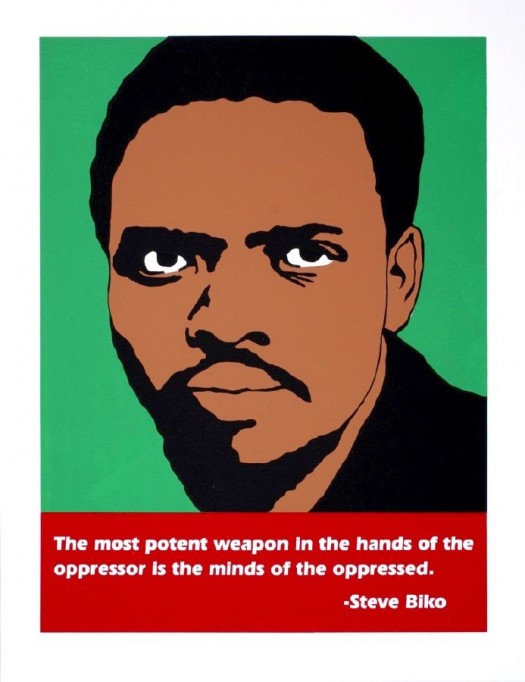Image of the Day (and a few words): Steve Biko
“A people without a positive history is like a vehicle without an engine.” – Steven Biko
My father was the first person to talk with me about Steven Biko. He’s taught me the most about African revolutionaries: Lumumba, Toure, Cabral, and so many more. My dad knew many of these men (and yes, growing up all revolutionaries that I encountered through my dad’s stories were men). Biko he didn’t know personally but he admired him greatly. Dad gave me a bunch of pamphlets that included speeches and writing by Biko and others. I read them voraciously.
I was a teenager when the film “Cry Freedom” was released. I remember almost nothing about it except for the police interrogation and torture scenes. Those left their mark on my psyche. I’d of course heard the whispers about my own uncle’s interrogations, torture, and imprisonment as a kid. But the visual representations in “Cry Freedom” made that vague concept real. It’s strange writing these words because it now makes so much sense that I would became obsessed with organizing against policing and violence.
Desmond Tutu recounts the story of South African minister of police Jimmy Krueger who upon hearing of the torture and killing of Steve Biko in prison is reported to have said that his death “leaves me cold.” Tutu writes of this: “You have to ask what has happened to the humanity – the ubuntu — of someone who could speak so callously about the suffering and death of a fellow human being.”
Our capacity to dehumanize each other is seemingly boundless. And yet, we are also capable of demonstrating great compassion toward one another too. This, it seems, is the central paradox of humans. The persistent question is which part of ourselves will we feed.
The police officers who tortured and killed Steven Biko on this day in 1977 chose to feed their inhumanity. [Read the harrowing sequence of events that led up to his death here]. They thought to bury Biko’s ideas (which they found so threatening) along with his body. They failed because some of us still remember the potency of his philosophy. He was the one who said: “It is better to die for an idea that will live, than to live for an idea that will die.”
Were he alive today, Biko would surely be dismayed at the fact that white supremacy & domination persist in his beloved South Africa even though its leaders have black skin. He would remind us that blackness is about more than skin color. Now more than ever, we need to re-animate Biko’s ideas and apply them to our current challenges.
So today, please do me a favor, read something that Biko actually wrote himself. Not an article about him or someone else’s testimony of who the man was. Not an out of context quote that you find on the internet. Read his original writing. Let’s recover his voice.
You can listen to Biko talk about the Black Consciousness Movement below:

